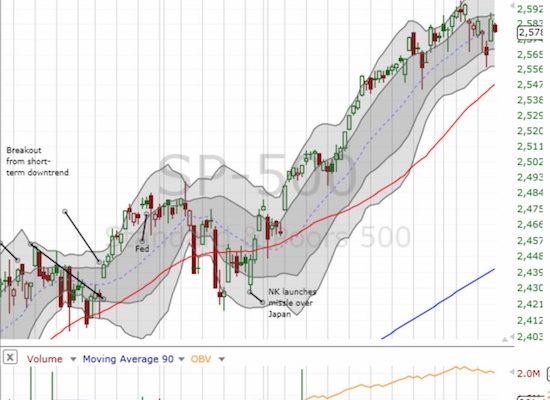AT40Â = 47.9% of stocks are trading above their respective 40-day moving averages (DMAs)
AT200Â = 54.6% of stocks are trading above their respective 200DMAs
VIXÂ = 11.4
Short-term Trading Call: cautiously bullish
Commentary
The S&P 500 (SPY) failed to follow-through on Thursday’s snapback rally, but a bullish divergence kept the short-term prospects looking good. While the index gapped down and fell fractionally, AT40 (T2108), the percentage of stocks trading above their 40-day moving averages (DMAs) rallied into a positive close. My favorite technical indicator gained two percentage points to close at 47.9%.
In a surprising plot twist, small caps led the way as the iShares Russell 2000 ETF (IWM) bounced off its 50DMA to close with a fractional gain. Until the last two days, small caps were helping to underline the drag on the market that earlier represented narrowing participation in the stock market’s rally and formed a bearish divergence.

The S&P 500 cooled off a bit after a strong snapback rally. The index conveniently closed on its still uptrending 20DMA.

The Nasdaq fell from a marginal all-time high and is trying to cling to its re-entry into its upper-Bollinger Band (BB) channel.

The PowerShares QQQ ETF (QQQ) also feel from its new marginal all-time high but did not hold its upper-BB channel.

Suddenly, iShares Russell 2000 ETF looks ready to resume its previous rally. I am watching for the downtrending 20DMA to flatten.
The volatility index, the VIX, continued its fade from Wednesday’s spike higher. It is a move that confirmed the bullish divergence.
The Australian dollar however is still not cooperating. Its weakness continued. Against the Japanese yen, AUD/JPY confirmed a double breakdown: the 200DMA gave way as support AND the head and shoulders pattern completed its bearish warning.

AUD/JPY followed through on a bearish breakdown.
Time is ticking away for the bears and sellers as the period between Thanksgiving and Christmas is typically a very mild, even bullish, period for the stock market.

